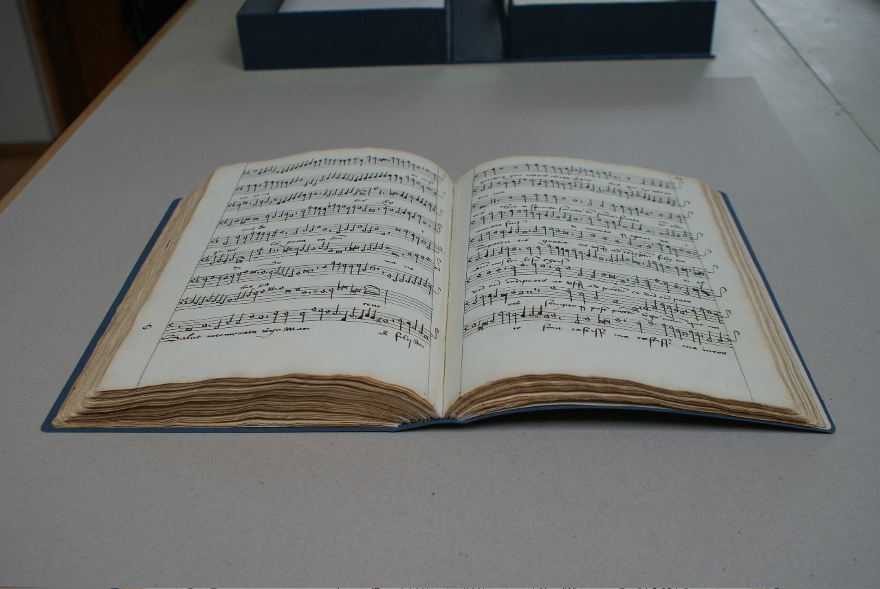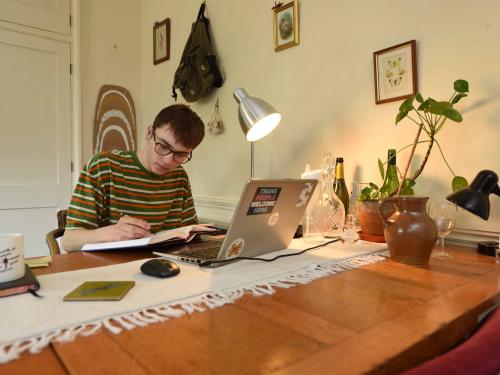Breadcrumb
Music
Information on the Cambridge Music course can be found on the University website, as well as the Faculty of Music website.
The Cambridge music course will give you a grounding in history, analysis and harmony while also exploring the vast range of ways that music affects people’s lives around the world. There are also optional strands in performance, composition and the science of music.
Music Course Film
Music at Peterhouse
Peterhouse usually admits one student for the Music course each year. Our external Director of Studies is Dr Jeremy Thurlow, a Fellow of Robinson College.
Course Requirements
Most Music students will have taken A level Music or equivalent, but it’s possible to study Music at Cambridge without having studied the subject at A level (or equivalent); however, such candidates will need to have achieved a Merit or above at Grade 8 ABRSM Theory to be eligible for a place. Music Technology is not normally an acceptable substitute.
A basic degree of keyboard ability is useful, as there is a small keyboard element in the first year, and in several other papers it can help if you are able to try out ideas on the piano. Applicants should be interested to explore the Western classical repertoire across a variety of periods as well as other genres of music, should already know a variety of composers/performers, and should be beginning to read about music, ideally beyond what is required in the A level course. A well-developed musical ear and some proficiency in harmony and counterpoint are also desirable, though few successful applicants have equal ability in all these areas.
The application process
We ask all our Music applicants to send us two recent essays on a music history topic that they have written recently as part of their school work, and also one musical exercise or piece: this can be a harmony and/or counterpoint exercise in some historical style (for example, in the style of Bach or Palestrina), or another exercise in a historical style, or an original composition. Applicants who have not written essays for Music A level can send an essay from another arts/humanities subject.
Applicants who play an instrument to a high level, or who sing, may also, if they wish, send in a recording of their playing or singing, in the form of an mp3. The piece should not last more than roughly 10 minutes, or 15 minutes in total if the applicant wishes to send recordings on two different instruments (or instrument and voice). Mp3s can be emailed to the Admissions Office. Sending in a recording is purely optional; those who choose not to do so will not be at any disadvantage.
We aim to interview all candidates with a realistic chance of admission – generally those on track to meet our typical academic conditions. Candidates will be given a short exercise in basic harmony and essay writing (1 hour in total), and will receive two interviews. They will also be given brief passages of music and writing to look over and then discuss in the interviews.
The subject interview will typically cover the following:
- A level syllabus and how far through it you have progressed.
- Questions arising from the written paper.
- A discussion of a short extract of writing about music and a short extract from a musical score, both of which are given to you to look over shortly before the interview.
- Some very brief aural tests (describing chords, intervals, rhythms) and keyboard tests (such as playing cadences in different keys). Advanced piano skills are not necessary and candidates who are not primarily pianists should not feel discouraged!
- General questions about music. These will not be esoteric but will concentrate on the mainstream repertoire and on your particular interests.
- At the end of the interview, you can ask any questions you might have.
Typical conditional offers
Our typical conditional offer for Music is A*AA at A level. The A* doesn’t need to be in Music, though on rare occasions we may make this a condition of entry. IB offers are usually for a minimum of 41-42 points, to include 776 or 777 at Higher level in relevant subjects. Offers are designed to be realistic, taking into account individual circumstances, and to reflect potential and likely levels of achievement. Most of those who receive offers will attain the grades required.


